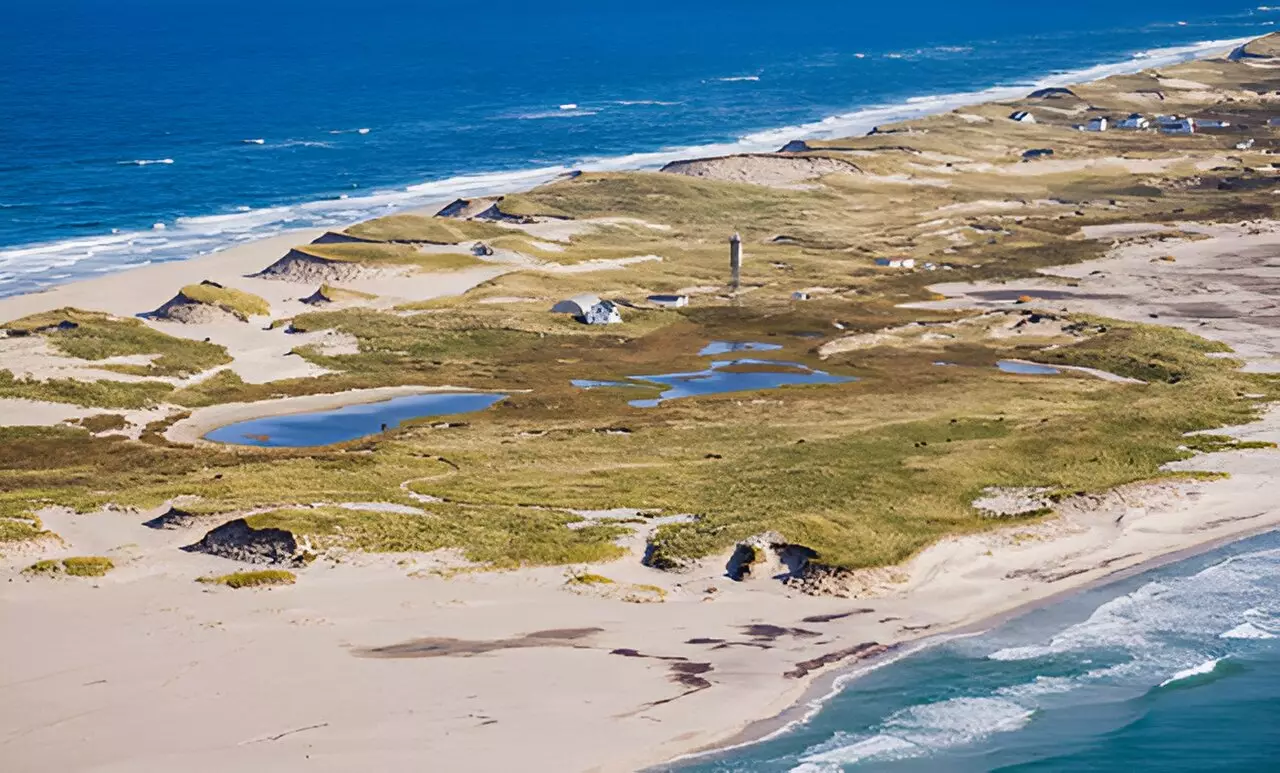Sable Island, located almost 200 kilometers off the coast of Nova Scotia, is a place known for its beauty and biodiversity. This slender, crescent-shaped island has long been home to mythic wild horses, rare seabirds, and unique plant and insect species. However, new research conducted by Dalhousie University suggests that the island’s ecosystem is facing a critical challenge – the loss of fresh groundwater. This loss of freshwater is essential for the survival of the island’s wild horses, plants, and birds. The study, led by Julia Cantelon and published in Water Resources Research, highlights the impact of dune erosion, storms, and hurricanes on the island’s freshwater resources.
The research team from Dalhousie University assessed the quantity and quality of Sable Island’s fresh groundwater. They compared current data collected from 2019 to 2022 with measurements taken in the 1970s. The findings revealed a significant loss of fresh groundwater, which is closely tied to decades of dune erosion, storms, and hurricanes. During these weather events, seawater floods the beaches, infiltrates the ground, and salinizes the freshwater resources. With repeated storm battering, dune erosion can lead to a shift in groundwater salinization towards the land. The study emphasizes the unique opportunity provided by Sable Island’s historical monitoring data to assess long-term changes in fresh groundwater coupled with the island’s dune system.
The research by Cantelon and her team indicates that while rainfall can flush out saltwater from the groundwater, there is often not enough time for the freshwater to recover before being flooded again by subsequent storms. The concern lies in the steady erosion of the island’s dunes, which has significantly reduced the volume of the freshwater lens. The freshwater lens refers to the zone of fresh groundwater present in small islands like Sable Island. This groundwater flows into freshwater ponds, sustaining the island’s rich and unique ecosystem. Dr. Barret Kurylyk, a co-author of the study, warns that the results have implications for freshwater security on other small islands worldwide, which rely on groundwater for drinking water supply and are similarly threatened by salinization.
The study highlights the vulnerability of coastal freshwater resources to saltwater contamination caused by coastal seawater flooding. Thousands of kilometers of shoreline are devastated annually by these flood events, making coastal fresh groundwater resources highly susceptible to contamination. The authors argue for the urgent need to establish more comprehensive and long-term programs for monitoring and mapping coastal groundwater to understand saltwater incursion processes better. This knowledge can inform appropriate management action to address the threats posed by erosion, storms, and flooding.
The work carried out by the Dalhousie University researchers contributes to the ongoing research into Sable Island’s hydrology. While previous studies have focused on the impacts of sea-level rise, human activities, or coastal flooding on the island’s freshwater lens, this study highlights the often-overlooked role of erosion in freshwater loss. Dan Kehler, the ecologist with Parks Canada, acknowledges the important role played by hydrology in understanding the dynamics of Sable Island. He emphasizes that the work conducted by the Dalhousie researchers has advanced their understanding of the freshwater resources and processes on the island, aiding in the conservation efforts led by Parks Canada and its partners.
Since the creation of the National Park Reserve in 2013, Parks Canada has been responsible for stewarding Sable Island. Working collaboratively with partners and the Mi’kmaq of Nova Scotia, Parks Canada strives to protect and preserve this ecologically significant island. The research conducted by Cantelon and her team provides valuable insights into the challenges faced by Sable Island and can inform future conservation efforts. It underscores the need for proactive measures to safeguard the island’s fresh groundwater resources and the unique ecosystem it supports.
Sable Island’s ecosystem faces a significant threat in the form of freshwater loss. The research conducted by the Dalhousie University team sheds light on the impact of erosion, storms, and hurricanes on the island’s freshwater resources. The findings highlight the vulnerability of small islands worldwide that rely on groundwater for freshwater supply. Urgent action is needed to establish comprehensive monitoring programs and inform appropriate management strategies to address the threats posed by coastal flooding and saltwater intrusion. Through collaboration and conservation efforts, we can strive to preserve the fragile ecosystem of Sable Island for future generations.



Leave a Reply